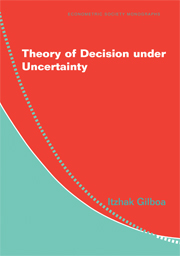III - Alternative Behavioral Theories
Published online by Cambridge University Press: 05 January 2013
Summary
We ended the discussion of Savage's theorem by criticizing his axioms on descriptive and normative grounds alike. If the axioms do not always hold, and, furthermore, they might be dubious even as standards of rationality, we can proceed in two directions, which might be combined. One is to cling to the notion of probability, but to abandon the behavioral derivations of Ramsey–de Finetti–Savage and seek an alternative definition of probabilities. The other is to remain loyal to the behavioral approach and ask what alternative notions of belief can describe the way that people make decisions or the way that they can be convinced to make decisions when they attempt to be rational. And a combination of the two would allow for both different notions of beliefs (not only probabilities) and different types of definitions (not necessarily behavioral).
In the following chapters you will see all three. We begin by the second route, which adheres to the behavioral definition but allows different notions of beliefs, namely, nonadditive probabilities (including a digression to study prospect theory under risk) and multiple priors. We will then drop the behavioral approach and adopt a cognitive one. (This will mark the beginning of Part IV.) Within the cognitive direction we will consider models that use probabilities but also others that have less structured notions of beliefs.
- Type
- Chapter
- Information
- Theory of Decision under Uncertainty , pp. 145 - 146Publisher: Cambridge University PressPrint publication year: 2009



